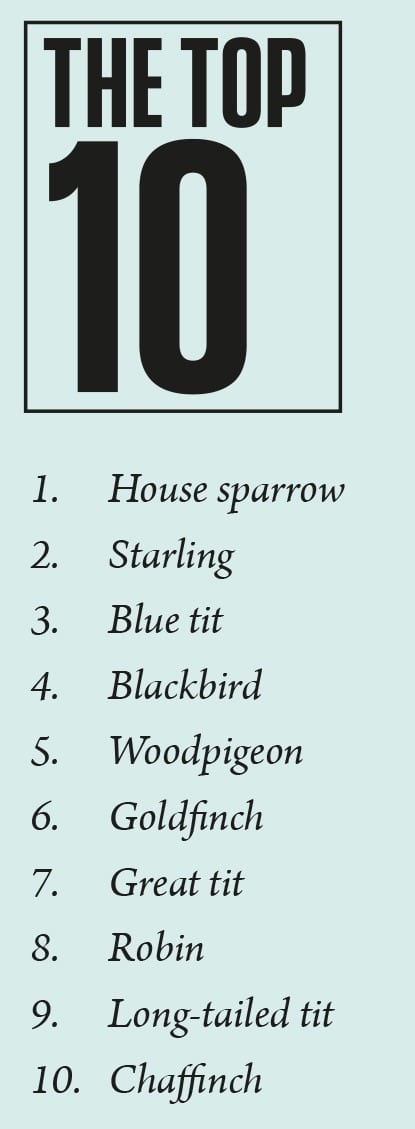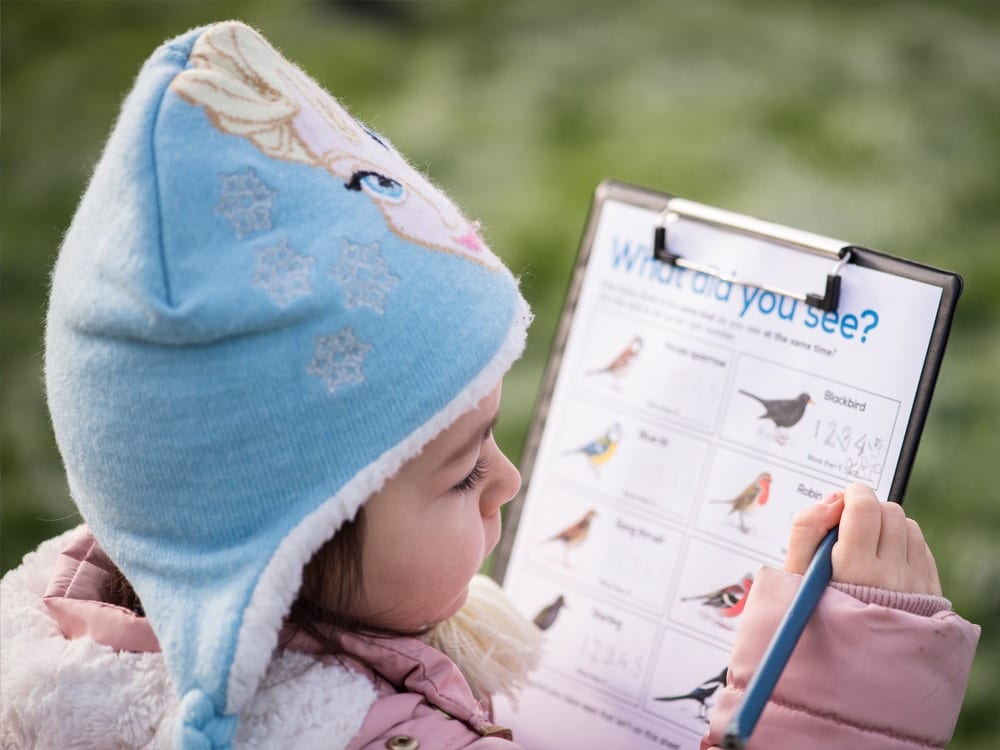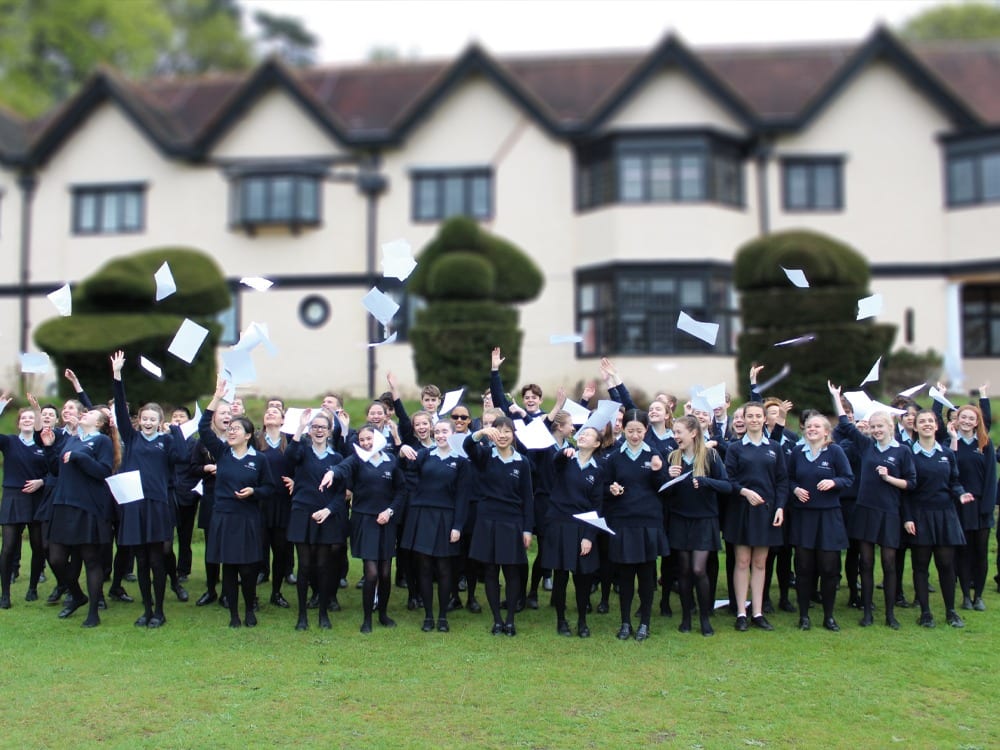School days are the happiest days of your life, right? Check out our education guide and find out how you can make them really top class including information on bird watching, how to choose the right school for you, adult education and work experience.
FLYING HIGH
As we enter a new year, Karen Neville teams up with the RSPB to encourage you and the schoolchildren in your family to spot local birds in your garden.
A staggering 6,764,475 birds were spotted during last year’s RSPB Big Garden Birdwatch, thanks in no small part to the thousands of schoolchildren who joined in. Youngsters spotted robins, starlings and blue tits among the millions recorded for the annual count.
And now it’s time to do it all over again to see which ones are thriving and which ones need your help to survive.
The house sparrow was the most common bird again in 2018, happy in both urban and suburban areas. Other birds flying high in the surveys included the goldfinch, long-tailed and coal tit while robins were down, largely due to the mild winter which made food more widely available in the countryside meaning the red-breasted bird didn’t have such a need to visit our gardens.
The birdwatch is 40 years old this year and has grown hugely since youngsters were given the opportunity to get involved in a simple winter activity.
From counting the birds in your garden to determine which are the UK’s top 10 most common species, the RSPB Big Garden Birdwatch has become one of the most participated in nature events across the country, enjoyed by young and old.
Only a few hundred children were expected to take part when it started in 1979, but thanks to Blue Peter, more than 34,000 surveys were completed and results gathered.
Now schools turn their classes into conservation zones and help track the ups and downs in bird numbers through a variety of fun activities before, during and after the Big Schools Birdwatch which helps youngsters develop an interest in wildlife and the world around them.

Simple survey sheets are a great way to get started, helping you to count the birds with colourful worksheets designed for three age groups – five to seven years, seven to 11 and 11 to 14-year-olds. Focussing on the most common birds likely to be seen, youngsters are invited to record how many of each one they see and to draw any not included as well as recording any unusual features noticed.
Why not feed the birds as you record them and perhaps even entice a few more into your garden or school grounds? The RSPB has a range of recipe ideas that you can make too – pastry maggots, pine cone lardy seed feeders and a suet and nut log are just some of the tasty treats to encourage feathered friends to feel at home!

Games are also a great way for pupils to learn about the birds around them and recognise them as they take part in the count – try matching pairs of pictures with a fun memory game or how about a “top trumps” game comparing your favourite feathered facts?
However you enjoy the Big Schools Birdwatch, your help is essential to ensure the birds in our gardens and school grounds are protected. The Big Garden Birdwatch takes place from 26th to 28th January and you can submit your findings until Friday, 22nd February.
![]() To take part visit www.rspb.org.uk
To take part visit www.rspb.org.uk
HAPPY FAMILIES
Choosing a school or nursery for your child can be a case of heart versus head…
At The Royal School, we understand choosing the right school for your child will be one of the most important decisions you ever make.
It is a decision that you will take with your head, having completed all the necessary research, but we know that you will really take it with your heart, based on your knowledge of your child and of his or her particular needs at any given time in their education.
There are many factors that a parent needs to consider. When seeking a nursery for your two-year-old, questions around sleep routines, food, toilet training and managing tears and tantrums will be high on the agenda. When seeking a primary or prep school, you will have questions about curriculum, homework, pupil-teacher ratio, friendships, lunches and wrap around care.

When it comes to selecting a senior school, considerations relating to the curriculum, examination results, behaviour management, ethos, class size, extra-curricular provision and the school environment will be on your mind. And when you are looking for a sixth form, you will want to know about university destinations, examination success, opportunities for the development of life skills and careers education. The list goes on…
Here in the south east, parents are blessed with a wide range of excellent schools and nurseries from which to choose and the choice can sometimes feel rather overwhelming, especially when friends and family also add their opinion into the mix. In the end, the decision is easier than you would think. Take time to visit the schools and nurseries in the area. Look beyond the first impression of bricks and mortar – is there a purposeful buzz of activity? Do the children or young people look happy and engaged? Do the teachers appear passionate about their subject? Is the head teacher approachable?
Choosing a school or nursery is rather like choosing a family home; it can all seem incredibly complicated, but ultimately, it is the one that has the right feel that will be the right choice. This is very personal; one size does not fit all!
By Mrs A Lynch, principal of The Royal School and Mrs K Daunter, head of the Junior School.
![]() Visit www.royal-school.org
Visit www.royal-school.org
ADULT LEARNING
Who says you can’t teach an old dog new tricks? Here are some reasons why learning in later life is beneficial!
Yes, young brains are most adept at learning languages and skills, but the benefits of taking up a new skill after school age are many!
For those who are recently retired or considering a career change, a lack of direction can be demoralising. Embarking on an adult learning course and picking up new skills can be incredibly rewarding, and fun too.
Signing up to a new course, trying out a new sport, learning a new language or experimenting with a new instrument can boost . It’s important to step outside of your comfort zone from time to time and apply yourself to something completely new. Lifelong learning helps you to continually grow and develop as a person and it’s good for your mental ability if you’re always putting your mind to something new.
Adult education courses significantly benefit learners, a survey by the Workers’ Educational Association suggests. According to the survey of 2,000 adult learners, education boosts confidence about finding employment and benefits local communities.
Of course, we’re constantly told that physical exercise is important for keeping our bodies in good condition, but it’s just as important to keep your mind active, too. Taking in new information helps to stimulate your mind, and studies have proven that this can help to reduce a person’s risk of Alzheimer’s disease and dementia.
You’re never too old to learn, and with advances in technology making e-learning more accessible than ever, there are no excuses for not giving it a go.
![]() Visit www.wea.org.uk for more ideas and check out the University of the Third Age.
Visit www.wea.org.uk for more ideas and check out the University of the Third Age.

WORK EXPERIENCE
Don’t be shy of taking your first step into the workplace!
Work experience can be a daunting prospect when you’re in Year 10 and more interested in playing on the X-Box or the latest gossip. But it’s more important than just a week off lessons…
It’s a great way to find out whether a certain type of career is for you. You’ll get the chance to learn new skills, make contacts and experience what it’s like working a whole day.
But where do you begin? A good place to start is follow your passions. Try to do something you’re interested in – if, for example, you love animals, contact any zoos or animal sanctuaries. If being on stage or behind the scenes is your thing, try local theatres.
Once you have a general idea start checking out the businesses and companies in your area as well as speaking to your school careers adviser.
And don’t be disheartened if places you contact aren’t able to help; there are plenty of options. Some companies offer structured placements but competition can be tough so make sure you know what you want and how to ‘sell’ yourself. Many places will expect you to complete an application form too so double check your spelling and grammar when doing so.
Having gained a place, hopefully with your chosen employer, put your nerves aside – a tricky one – and remember to make contact ahead of your placement to confirm details such as times, dress code, what to wear etc and a bit of research on them doesn’t do any harm, either.
You’re now ready for your first proper day at work – make the most of it, you never know where it could lead…








